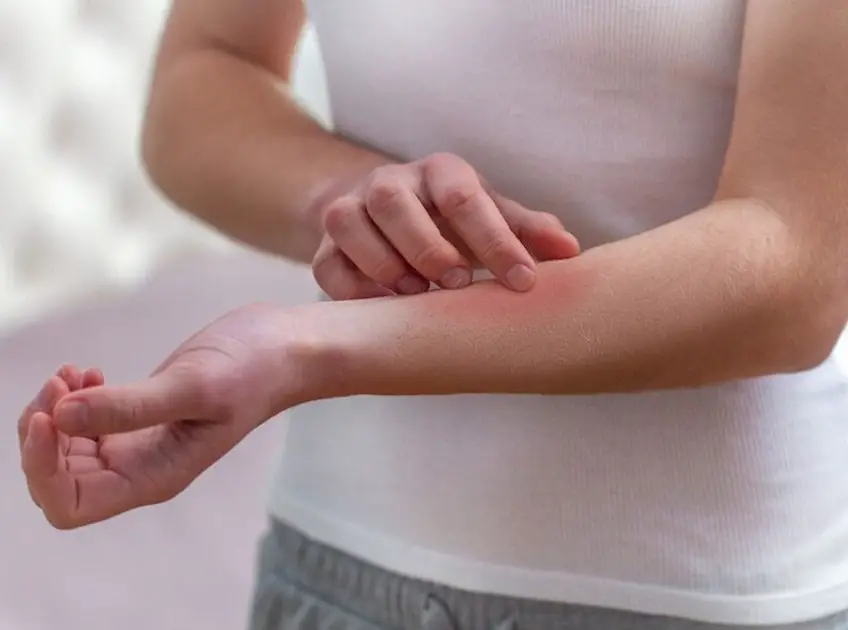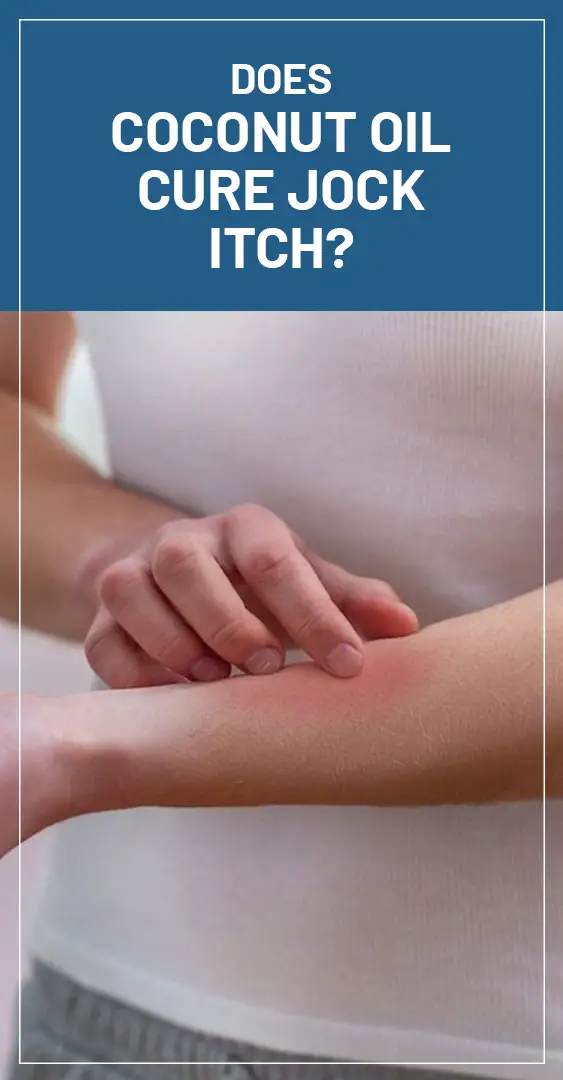
Important: This article is for informational purposes only. Please read our full disclaimer for more details.
Jock itch, medically known as Tinea cruris, is a fungal infection of the skin. It is caused by dermatophytes– a mold-like microscopic fungus that lives on skin, hair, and nails and grows in sweaty areas.
Generally, dermatophytes are harmless, but they thrive and multiply quickly in warm and moist conditions, developing itching and burning sensations. Usually, they grow around genital, pubic, perineal, and perianal skin that involves the inner thighs, groin, and buttocks.
While over-the-counter antifungal treatments knock out the fungus and provide relief from Jock Itch, some home remedies like coconut oil also prove beneficial due to its antifungal properties.
Before understating the role of coconut oil for Jock Itch, let’s know a bit more about this intimate issue.
Coconut Oil For Jock Itch
What Is Jock Itch?
Jock Itch is a fungal infection. ‘Jock’ refers to athletes or people primarily interested in sports. Since athletes are prone to getting this infection due to intense sweating or wearing tight-fitting underpants; therefore, the name ‘Jock Itch.’
However, athletes alone are not susceptible to getting Jock Itch.
It can happen to anyone who sweats heavily and develop moist areas around the groin. It leads to red rashes followed by itching and flaking skin in the region. If not treated promptly, the fungus multiplies and spreads further.
In severe cases, the rashes develop into bumps, scales, or blisters on the skin surface.
Jock Itch is an opportunistic infection that often affects people with a weak immune system. Coconut oil, a rich source of antioxidants, can improve the ability of the immune system to protect against all kinds of diseases and infections.
Coconut oil’s protective powers come mainly from its medium chain fatty acids, making it a perfect go-to natural remedy for Jock Itch.
Let’s know how coconut oil helps in controlling the symptoms of Jock Itch.
Use Of Coconut Oil For Jock Itch
Coconut oil is a natural tropical antifungal product used topically and internally. From adding it to meals to applying it directly over the skin, coconut oil has proved to be one of the versatile natural ingredients.
The three properties of coconut oil that set it apart and beneficial against Jock Itch are-
1. Antifungal Properties
Coconut oil is a rich source of caprylic acid, capric acid, and lauric acid. These three medium chain fatty acids hold antifungal and antibacterial properties, making them effective in inhibiting and killing most fungi and bacteria.
It is safe to apply coconut oil to all skin types, including sensitive skin. It is effective against Jock Itch and is often used to treat vaginal yeast infections, athlete’s foot, and to kill ringworm. Additionally, it is also useful as a natural diaper area cream.
2. Moisturizing Properties
Coconut oil acts as a moisturizer and deeply conditions the skin. It improves how the skin feels and looks. It has been traditionally used as a moisturizer in the tropical region for centuries.
The application of coconut oil on the skin makes it well-nourished and deeply moisturized. When skin gets flaky and scaly due to Jock Itch, coconut oil helps. It also reduces the burning sensation.
3. Anti-Inflammatory Properties
Studies have revealed that coconut oil possesses anti-inflammatory and skin protective properties and can help in multiple skin disorders by soothing and moisturizing the skin. It also provides essential elements which increase blood circulation to the affected area.
How To Use Coconut Oil For Jock Itch?
Apart from consuming coconut oil and making it a part of your diet, you can apply coconut oil topically to the affected areas. Before doing so, clean the infection properly and then dab the oil directly on the infected area.
Using pure or virgin coconut oil will give better and faster results.
You can apply coconut oil to the affected areas multiple times a day. A few times that need special attention are-
- After bathing- Dry off the skin thoroughly after bathing with a soft towel and apply coconut oil.
- After workout- If you are involved in physical activities that make you sweat, dry the affected areas and apply coconut oil.
- Before sleeping- As you go to bed, apply coconut oil to the affected areas to have a good night’s sleep.
Apart from applying coconut oil alone, you can also make healing oil for Jock Itch.
Healing Oil For Jock Itch
It requires oils and other ingredients that have strong anti-inflammatory and antimicrobial properties. To make healing oil, you would require-
- Coconut oil- 2 tablespoon
- Neem oil– 2 tablespoon
- Apple cider vinegar– 1 tablespoon
- Lavender oil- 10 drops
- Tea tree oil– 5 drops
Mix all these ingredients in a glass jar and blend with a spatula until you get the desired consistency. Rub this healing oil on the affected areas twice or twice daily for the best results.
Final Words
Jock Itch can be troublesome, especially when the symptoms grow profusely. Therefore, treating it before it gets worse is the right decision. While medications can help significantly, using coconut oil can prevent further spread and temporarily provide relief.
Coconut oil is a perfect solution for a mild infection and is a great source to prevent it from spreading. Keep the affected area clean and dry, and do not forget to apply coconut oil to combat the itching and burning sensation.
You Might Also Like:
- 7 Simple Home Remedies For Dry Itchy Scalp
- Aloe Vera for Eczema
- How to Use Apple Cider Vinegar for Skin Rash?
- Coconut oil For Hair, Skin and Face
- 14 Surprising Beauty Benefits of Baking Soda You Must Know!
- Coconut Oil For Acid Reflux
- How to Use Coconut Oil for Constipation?
- How to Remove Dandruff With Coconut oil?
- Coconut Oil for Diaper Rash: Does It Work and How to Use?
- How to Use Coconut oil for Dry Hair Treatment?
- Does Coconut Oil Work for Hemorrhoids?
- Does Coconut oil Help with Scars And How To Use It?
















